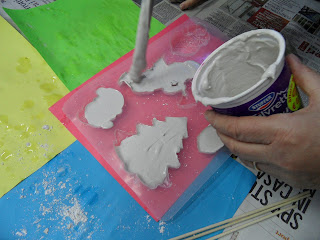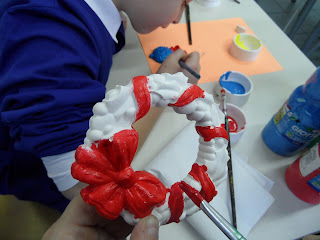Sunday, 29 May 2016
Wednesday, 27 April 2016
38 Exhibition Market of the Abruzzi Agricolture and Craftsmanship
Read the article made by the students of Istituto Tecnico Agrario di Alanno (class 1) about the 38 Exhibition Market of the Abruzzo Agricolture and Craftsmanship.
Teacher coordinator: De Vincentiis Rita
Article
Sunday, 3 April 2016
Pizza (Work in progress)
 During the first part of March, Italian students and teachers of Cugnoli Secondary School were involved in the realisation of Pizza, the most famous traditional Italian dish.
During the first part of March, Italian students and teachers of Cugnoli Secondary School were involved in the realisation of Pizza, the most famous traditional Italian dish.Here is the recipe:
DOUGH
1 kilo of flour
a glass of olive oil
some salt
warm water
a piece of yeast
TOPPINGS
Basil, mozzarella cheese, olive oil, salt, tomato.PHASES
In a large bowl combine water and yeast.
Add in flour, salt and olive
oil.
Knead the dough into a ball
and let it rest for two hours.
Roll the dough on to the pizza
tray.
Put tomato, olive oil, salt,
basil and mozzarella.
Put the pizza in the oven for 20 minutes at 200
degrees. Take the pizza and cut into slices. Enjoy it.
Traditional Italian cakes for Easter
On 14th March 2016, during the visit of the SOL delegations in Italy, teachers, students and parents of the Alanno Scalo Primary and Secondary School planned the realisation of Pupe and Cavalli (Puppets and Horses) typical Italian cakes baked at Easter time.
Tuesday, 1 March 2016
Live-baking of Šakotis cake
On the 27th of February, Saturday morning, the representatives
of Kacergine Basic School community had an amazing trip to Šakiai
district Lekėčiai town. They visited Lekėčiai women's club Suvalkian
culinary heritage house, where they were welcomed by the women of the
club with hospitality. The guests were treated to traditional dishes of
this region. They had sauerkraut soup with cranberry jam and hot
potatoes. The guests also tried pork jelly, cottage chese with honey,
melted butter and a variety of herbal teas. Each dish was presented in
detail, revealing technological secrets of their production.
Tasting
delicious food was a great experience. However,everybody waited
impatiently for the other part of the visit to Lekečiai - šakotis baking
process, when the students were allowed to do the part of the work
themselves and observe how 21 layers of batter are turning into lovely
little branches of tasty cake. A special moment of the program was
removing cooled šakotis from the roller and smelling unique scent of the
cake spread around the room.
This dainty will go to Italy to Erasmus +
project SOL with our school delegation after 2 weeks.
Friday, 26 February 2016
Slovak students cooking national meal
Dumplings with sheep cheese is Slovak traditional meal typical especially in the middle Slovakia in region called Liptov. Our students cooked it at school and then they translated this recipe into English.
We would like to present this meal in international cookery book which will be created during the visit in Italy . ( 13 - 19 March 2016 )
Saturday, 2 January 2016
Picking up olives in Italy
Our school is
located in a hilly region, where olive oil is one of the main
agricultural products and also a is a fundamental ingredient in our
diet.
As agrarian school, we have both a science lab and a
panel test lab for virgin oil analysis, where we test its
characteristics and assess its quality.
Olive oil is obtained through the cold squeezing of
olives. It has various recognized positives characteristics: it's
excellent for child alimentation because it has acid composition
similar to maternal milk and it's composed predominantly of fat acid.
It is at the basis of Mediterranean cuisine, whose healthy value is
praised everywhere. In our laboratory we analyse organoleptic
characteristics, including acidity.
In southern Italy olive trees are very common and
they are part of the landscape, In each region there are different
varieties of plants, from which the different characteristics of the
oil. The plantations on the Adriatic side are very large, so other
plants are cultivated in the same land, from which derive different
flavours: in fact oil takes on the flavour of the surrounding plants.
The harvest begins around 10th November to avoid low
temperatures and there are many harvesting techniques, their
differences depend on type of plants but in past the harvesters used
to collect the olives in a basket fastened to their waist. Nowadays
we use modern equipment like mechanic olive harvester and the olives
fall on a net that allow comfortable harvest.
Our classmate Ruben comes from Raiano, a
village situated in the centre of Abruzzo, in the province of
L'Aquila, precisely in the Peligna Valley. It was an important
stretch on the road of the transhumance. The population, mainly
composed of small farmers, still relies on agriculture and sheep
grazing. The predominant cultivation of Raiano is the olive and many
plants are hundreds of years old. His grandad says that some of the
olive trees date back to 1600.
Teacher Maria Cristina Nativio
Istituto Tecnico Agrario di Alanno
Christmas cards and crafts in Italy
Students of Cugnoli Primary School were involved in making Christmas cards and crafts as gifts to their dear ones.
Subscribe to:
Comments (Atom)

























